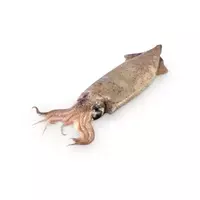Squid

Over the past decades in Russia, the popularity of exotic seafood has simply increased unrealistically, which is primarily due to their availability. Lobsters, octopuses, mussels, langoustas. . . and squid. With not only nutritional value and excellent taste, these mollusks do not in vain bear the second name "sea ginseng, " since all the healing properties of the squid are not easy to describe. Well, let's get to know them better.
Having a cephalopod with ten tentacles, the squid belongs to the most unusual inhabitants of the sea. It is known that dishes from this mollusk were popular in ancient Greece and Rome, where it was called "winged fish. " And all because of the ability to jump out of the water, fleeing the chase, and fly over its surface up to 20 meters. By the way, it is interesting that in terms of speed, the squid is second only to swordfish, tuna and dolphins.
As for the field of culinary art, mainly carcasses and squid tentacles are used for food. And in Japan, they also eat eyes, classifying them as delicacies. The dishes from this clam differ in their variety. There are a great many options for making squid: it is eaten both boiled, dried, fried, pickled, stewed, baked and canned. It is often added to salads, and is also used in the manufacture of mince for pies, rolls, cabbage rolls, dumplings and sushi.
Another useful property of the squid is the ability to combine well with almost any product, be it rice, vegetables, mushrooms, apples or onions, red wine or various sauces, as well as spices and spices. Moreover, the calorie content of the squid is small and is exactly 100 kcal per 100 grams.
Benefits of squid
Squid is a dietary product that contains not only easily digestible protein, but useful fatty acids. In addition, the benefits of the squid are beyond doubt, due to the fact that it is rich in taurine, which contributes to the elimination of cholesterol dangerous to the body, while stabilizing blood pressure and reducing the risk of heart and vascular disease.
Squid meat is simply replete with extractive substances that improve food digestion and at the same time give dishes a unique taste. The benefits of squid for baby food have also been known for a long time. Due to arginine and lysine, this mollusk has a favorable effect on the younger organism.
Squid harm
In addition to individual intolerance, there is another likely possibility of facing the harm of a squid in the form of a nervous system disorder. This is due to the fact that the meat of this mollusk absorbs some dangerous compounds that are contained in seawater, for example, mercury.
Experts also strongly discourage the consumption of squid dried, because excessive fascination with this snack can provoke salt deposition and retain excess fluid in the body.
squid 100 kCal
The energy value of the squid (Ratio of proteins, fats, carbohydrates - ju):
Proteins: 18 g (~ 72 kCal)
Fats: 2.2 g (~ 20 kCal)
Carbohydrates: 2g (~ 8kCal)
Energy ratio (bj | y): 72% | 20% | 8%
 Español
Español Français
Français Português
Português Русский
Русский 简体中文
简体中文 繁體中文
繁體中文 日本語
日本語 한국어
한국어 العربية
العربية Türkçe
Türkçe Қазақ
Қазақ Deutsch
Deutsch Italiano
Italiano Українська
Українська
